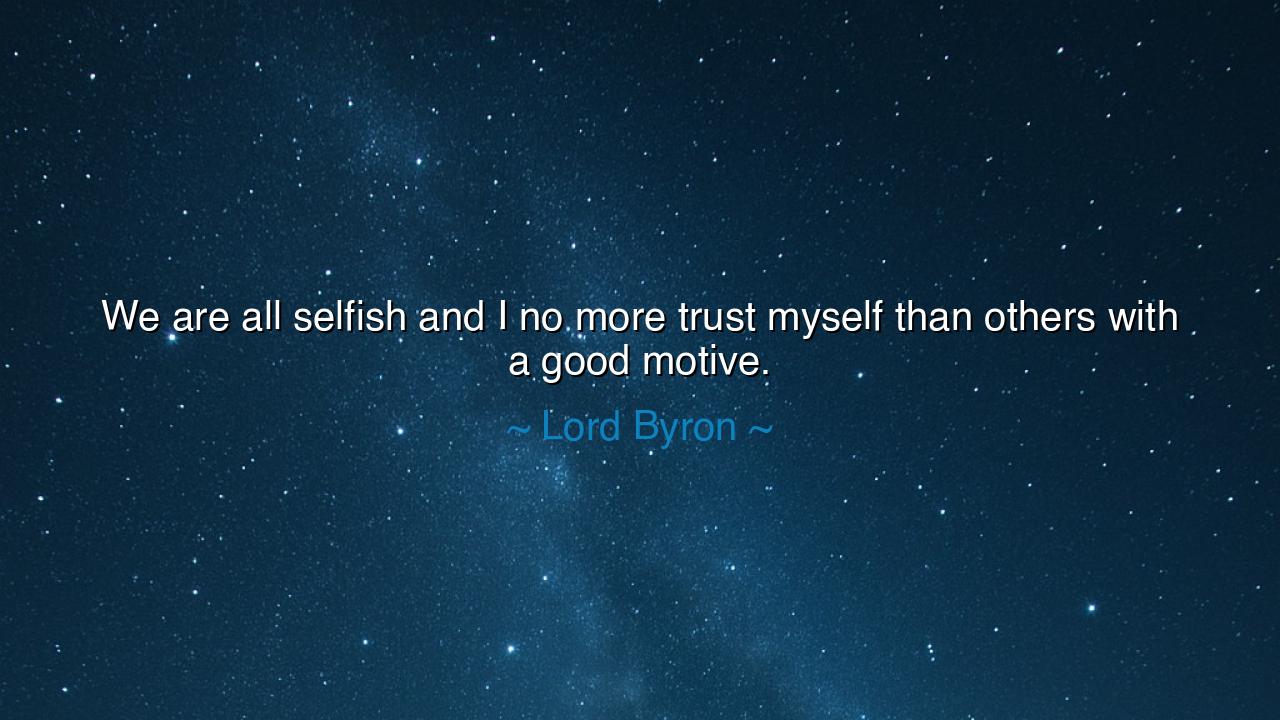
We are all selfish and I no more trust myself than others with a






The words of Lord Byron—“We are all selfish and I no more trust myself than others with a good motive.”—are both a confession and a warning. In them we hear not the arrogance of a poet, but the humility of a man who understood the depths of human frailty. Byron pierces the veil of self-deception, reminding us that selfishness is not the flaw of a few, but the inheritance of all. He does not exempt himself from this truth; instead, he places his own heart upon the scales and finds it wanting. Here lies the wisdom: to distrust even one’s own motives is the first step toward honesty and integrity.
To declare that we are all selfish is to acknowledge the universal shadow of human desire. Each man, no matter how noble, is touched by the impulse to serve himself first. This selfishness may be cloaked in fine words, dressed in charity, or masked as duty, but beneath it lurks the yearning for recognition, power, or advantage. The ancients knew this well. The Stoics warned of hidden passions; the prophets spoke of hearts deceitful above all things. Byron’s words stand in this tradition, exposing the vanity that clings even to our most righteous deeds.
More striking still is his refusal to trust himself with a good motive. For it is easy to doubt others and call it wisdom, but harder to turn suspicion inward. Byron does what few dare: he admits that even his own intentions cannot be taken at face value. This is not despair but humility, for the man who questions his motives is less likely to be ruled by them. The unexamined heart is a tyrant; the examined one, though still flawed, can be disciplined and restrained.
History offers powerful lessons of this truth. Consider Julius Caesar, whose ambition was clothed in the language of service to Rome. He claimed to act for the good of the Republic, yet his hunger for power led to its downfall. By contrast, George Washington, though tempted by similar ambitions, questioned his own desires and refused the crown when it was offered to him. In distrusting his own motives, he preserved liberty for his people. The difference between ruin and greatness often lies in whether a man examines his selfishness or excuses it.
Byron’s insight also illuminates the danger of blind idealism. Many revolutions have begun with noble cries for justice, only to descend into terror and tyranny when leaders ceased questioning their own motives. The French Revolution, born in the name of liberty and equality, devolved into bloodshed because men trusted their motives too much. They did not pause to ask: “Am I serving the cause, or serving myself?” Without this pause, noble words became weapons of selfish ambition.
The lesson for us is clear: practice vigilance over your own heart. Do not assume that every generous act is free from selfish desire. Ask yourself often: “Do I seek the good of others, or the praise of men? Do I act from love, or from pride?” Such questions do not weaken you; they strengthen you. For the man who doubts his motives refines them, while the man who trusts them blindly becomes their slave.
Practically, this means cultivating the habit of reflection. Before making great decisions, search your heart. Seek counsel from those who are honest enough to challenge you. Examine not only what you do, but why you do it. Do not despise yourself for selfish impulses—they belong to all mankind—but guard yourself against letting them rule unchecked. In doing so, you will live not in illusion, but in truth.
So let Lord Byron’s words stand as a beacon of self-awareness: “We are all selfish, and I no more trust myself than others with a good motive.” Take them not as despair, but as wisdom. For to admit selfishness is to begin the work of mastering it, and to question motives is to purify them. In this humility lies strength, in this vigilance lies freedom, and in this honesty lies the path to greatness.






AAdministratorAdministrator
Welcome, honored guests. Please leave a comment, we will respond soon